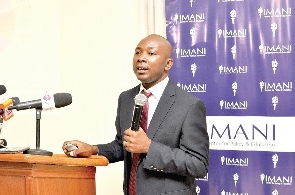 Professor Godfred Bokpin, Economist
Professor Godfred Bokpin, Economist
Economist Professor Godfred Bokpin has said this is the time for the Bank of Ghana to finance the country's budget in order not to stifle the economy from growth amid the COVID-19 pandemic.
According to him, it is not new for the Bank of Ghana to finance the country's budget, saying, it has existed all this while until 2015 when the then-government requested financial support from the International Monetary Fund, which led to a freeze on that provision.
Finance Minister Ken Ofori-Atta on Thursday, 28 May 2020, tabled before parliament a proposal for amendment to the 2020 budget in order for the government to borrow GHS10 billion from the Bank of Ghana to close the fiscal gap brought about by low imports and tax revenue.
But speaking to Class News, Professor Bokpin, who is also a finance lecturer at the University of Ghana Business School, told Blessed Sogah that: "As to whether the Bank of Ghana should step in or not, I think we have gone past the level. The needful thing to do right now is what we talk about money financing or monetisation of the deficit; this is the right time to do it, that is my candid view."
He added: "The next stage is: How do we deploy money and ensure greater value of money so that it goes to the productive sectors of the economy and achieve efficiency? That way, you minimise the extent to which this could hit the economy and create inflationary pressures."
Explaining further, the financial expert said: "Let’s look at it this way: The Fiscal Responsibility Act makes provision for exceptional circumstances. The Fiscal Responsibility Act understands that there are normal times and there are extraordinary times. For instance, it will be unique, this year, to talk about the 5% threshold in terms of the fiscal discipline, then it means that you do not appreciate what is going on and the enormity of the problem we have right now”.
"All over the world, what countries are doing is to do whatever that it takes to contain the impact and limit the impact, as far as possible because the point is that you can't even talk about COVID-19 if you don't do what you have to do to get out of this and begin to talk about the next phase".
"We need to understand where we are now as a country and I believe that it serves no body's interest to belittle the impact of COVID-19. We are not more concerned about the fiscal discipline than the US. We are not more concerned about debt sustainability than the IMF and the World Bank. In fact, we are not more concerned about debt sustainability than the Fiscal Responsibility Act. But you will see that all over the world, nobody is talking about debt sustainability today, even to the extent that the IMF is quiet, silent on debt sustainability because we have a huge crisis, economic crisis. The fiscal deficit of the US is even now about 18% of GDP", said Professor Bokpin.
He, however, called for the policing of the funds to ensure they are deployed effectively and efficiently, saying, "that is the way to go."
Meanwhile, the Dean of the University of Cape Coast Business School, Professor John Gatsi, has said that GHS10 billion being borrowed from the Bank of Ghana by the government is not within the remits of the law.
According to him, Section 30, as quoted by the Finance Minister, is clear that the funds are supposed to be a temporary loan or advances, while Section 3 of that law also stipulates that monies should be repaid within three months.
However, the Finance Minister is asking for a 2-year moratorium and an interest equivalent to the monetary policy rate for 10 years. "It’s not clear to me that is within the law", he said.
"The situation is a form of aggravation of the already existing precarious nature of the economy in terms of the finances. The point is that, during the period of emergency and the pandemic, there should be expenditure prioritisation and refocusing.
"The government has failed in this area of expenditure realignment, expenditure reorganisation, re-rationalisation and refocusing. If you don't do that, the picture will not be clear to us", he pointed out.